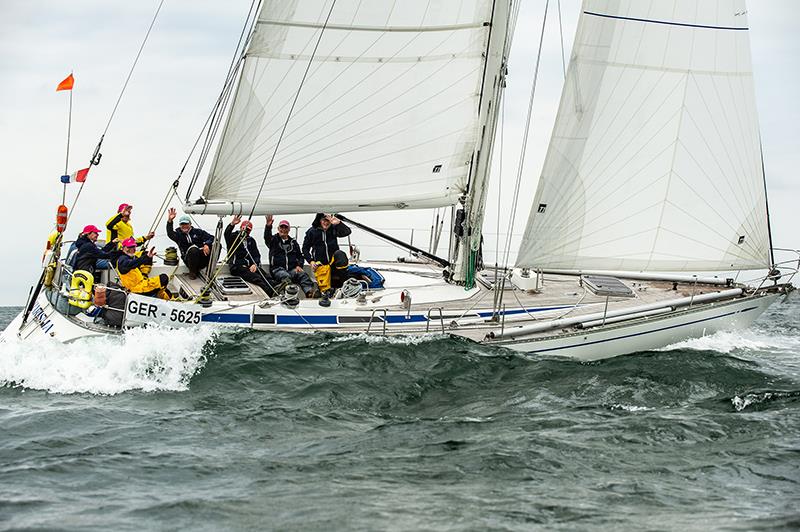
Use of autopilots aims to ease crew concerns for Transatlantic Race 2025
by New York Yacht Club 14 Mar 16:19 HKT
June 18, 2025

Constantin Claviez' Swan 44 Charisma, with a crew of seven, took 23 days to complete the Transatlantic Race 2023 © Paul Todd / Outsideimages.Com
It's the middle of a foggy night in the North Atlantic. The breeze is fickle and there is nary a star or landsight by which to guide the yacht. It's the sort of weather than drives helmspeople insane as they chase the compass this way and that, trying, often in vain, to find some semblance of equilibrium. Unless, of course, the steering is being handled by autopilot.
To date, one of the maxims of fully crewed American offshore racing has been that there must be, at all times, a human hand on the helm. For the Transatlantic Race 2025 this will not be the case as a new amendment to the Notice of Race for the ocean-crossing adventure will allow for autopilots throughout the fleet.
"The Transatlantic Race 2025 is a bucket-list race for many experienced racers and racer-cruisers and this decision targets that second group," says Dan Litchfield, co-chair for the race. "We are keenly aware of the planning and logistics that go into supporting a crew, and this difficulty scales up with crew size. The main motivation for allowing autopilots is to encourage participation by enabling boats, especially in the racer-cruiser division, to compete safely and effectively with fewer team members."
The Transatlantic Race 2025 is organized by the New York Yacht Club and the Royal Ocean Racing Club, with support from the Royal Yacht Squadron and the Storm Trysail Club. The race will start from Newport, R.I., on Wednesday, June 18, 2025, and finish off Cowes, England, one to three weeks later. The competitors will cover a distance of approximately 3,000 miles. IRC handicap scoring will determine the winners in each division. The 2025 edition will be the 32nd Transatlantic sailing competition organized by the New York Yacht Club. The race is sponsored by Peters & May, Helly Hansen and Safe Harbor Marinas. For more, click here.
Click here for the current entry list.
Autopilots have been around for centuries, evolving from the simple act of tying off the tiller to the windvane-controlled steering systems pioneered by round-the-world racers in the 1960s to computer-controlled systems that rely on supplied power and are integrated into the design of a yacht's steering assembly. For foiling ocean racers, which leap across huge swaths of the sea in unthinkably short times, the algorithms powering state-of-the-art autopilots have become more complex and better able to adjust to changing conditions and sea states and rapid changes in boat speed. But the majority of the boats that will take advantage of this amendment will be sailing more traditional ocean racing yachts with autopilots that rely primarily on heading and wind direction inputs to keep the boat on track.
In England and the rest of Europe, the use of autopilots for similar races is more common. The Rolex Middle Sea Race Rolex has allowed them at least since 2018. The Rolex Fastnet Race added the permission for all boats to utilize autopilots to its NOR for the 2023 edition.
"The RORC has found that the introduction of auto pilots has helped boats with less crew to take part in our longer distance races," says Steve Cole, racing manager for the RORC.
The United States has lagged when it comes to this tweak to Rule 52 of the Racing Rules of Sailing. And while that may continue to be the case for many of the races in the United States, a 3,000-mile race that could take some teams as long as three weeks to finish is the best event to test out a change to the paradigm.
Fresh off a victory in The Ocean Race—sailing an foiling IMOCA 60 with a crew of just five—2023 US Sailing Rolex Yachtsman of the Year Charlie Enright knows well the value of autopilots when it comes to reducing the number of crew required to race hard for long stretches of time.
"Allowing autopilots will help increase entries and ensure that boats don't need bigger crews, if that's something they're looking to avoid," says Enright. "Autopilots are commonly used in many types of sailing, racing and cruising, and should not be feared."
The amended NOR for the Transatlantic Race 2025 is online and registration is currently open. An early registration discount is available for all boats that enter by September 1, 2024. Click here for entry information.